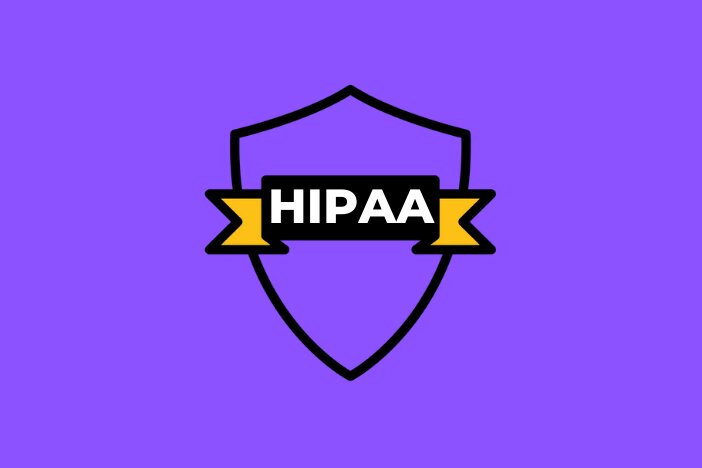You’ll need HIPAA Compliant Hosting if you’re managing an online business or offering a service that deals with medical data and patient records.
HIPAA is an American law that governs how those types of health details must be safeguarded online.
As a part of this regulation, the website and web projects must comply with HIPAA if they store or move a significant amount of healthcare data.
If your company is in the health sector or you use it to gather some health-related information from visitors to your website, it’s critical to ensure that it’s protected by law and that consumers trust it.
Finding HIPAA-compliant hosting, on the other hand, may seem as difficult as getting into Harvard, considering the value of preserving people’s private healthcare records.
So, how do you go about doing this? It’s not as difficult as you would believe.
Many hosting providers are familiar and compliant with HIPAA, and if you utilize them and their servers, your website will be HIPAA compliant as well.
In this post, I’ll go over what HIPAA compliant hosting means and provide you with a checklist that will enable you to find the best HIPAA-compliant hosting.
If you already own a website but don’t know how to make it HIPAA compliant, this article also contains a guide on how to make your site HIPAA compliant.
Let’s begin…
What is HIPAA Compliance?
The Health Insurance Portability and Accountability Act (HIPAA) is an acronym for the Health Insurance Portability and Accountability Act.
It’s a 1996 law in the United States that aimed to digitalize health records. Updating security requirements was a part of this modernization.
HIPAA compliance entails adhering to the regulations governing the protection of personal health information.
HIPAA regulations apply to a broad variety of businesses. These regulations apply to any agency that gathers, produces, or transmits any health records electronically.
What is HIPAA Compliant Hosting?
HIPAA compliant hosting ensures that the hosting company adheres to HIPAA’s requirements for keeping medical data on its servers.
Overall, these regulations are meant to avoid data breaches and to ensure that someone with personal information has a fair sense of privacy in terms of who can access it.
Physical protection, digital security (such as encryption, firewalls, and other security measures), breach reporting as well as other accountability, and so on are just a few examples of what the HIPAA guideline stipulates.
HIPAA-compliant web hosts aren’t needed for most websites. However, you will need to do so on occasion, especially if your website will be handling personal health information.
Why HIPAA Compliance is Mandated
According to the Department of Health and Human Services, HIPAA compliance is more important now than ever health care institutions and other agencies dealing with personal health information (PHI) move to digitalized operations such as computerized physician order entry (CPOE) systems, electronic health records (EHR), and pharmacy, radiology, and laboratory systems.
Health plans, likewise, have exposure to claims, care management, and self-service applications.
Although all of these electronic approaches improve productivity and flexibility, they also significantly raise the security risks associated with healthcare records.
The Security Rule was put in place to protect people’s health information while also encouraging protected organizations to use emerging technology to increase the quality and efficiency of patient care.
By design, the Security Rule allows a protected company to incorporate processes, strategies, and technologies that are appropriate for the organization’s nature, scale, and risks to patients’ and consumers’ e-PHI.
Choosing a HIPAA Compliant Hosting
Double-checking the HIPAA requirements is the most common approach to go about it. Check out the list below for a quick overview of HIPAA-compliant hosting specifications.
Another smart route to go is to go with the web hosts that have the best overall security framework.
This implies that, rather than only verifying if HIPAA criteria are met, you can also see whether the host goes far and beyond.
But, as somebody who operates a website and a company, it’s also important to think about your own necessities as well.
Definitely, safety takes precedence. But, apart from that, do you consider price as a deciding factor? Or would you like a lot of features to help you get a better deal on HIPAA-compliant hosting?
Most likely, you’re thinking about how easy it is to use a particular web host. Signing up for a web hosting company that provides managed hosting will take care of this.
You may be able to do away with more complicated hosting options, which may result in lower costs, based on the size of your company or your technological skills.
Many of the web hosts in this post, however, provide managed solutions, which may be more expensive but are a huge relief for many small to mid-sized companies, as they just have to think about maintaining the website, not the hosting.
See Also: How To Choose The Best Web Hosting – 25+ Factors To Consider
Checklist for a Good HIPAA Compliant Web Host
A decent HIPAA-compliant web host should have a mix of the items on this checklist.
This checklist is not the Holy Grail, but it does serve as a guide to help you select a HIPAA-compliant web host.
1. Firewalls and User ID
Firewalls are required to comply with HIPAA regulations.
To secure the server from unauthorized individuals, compliant hosting typically uses hardware, software, and application-level firewalls.
This security covers both access control and transmission security, which guards against unauthorized exposure to PHI.
The firewalls should be system-wide, according to HIPAA regulations. Firewall deployments are part of the criteria for restricting access to personal data held on a dedicated or virtual private server.
Using clear whitelists and blacklists, correctly configured firewalls will restrict or block access from anybody that ought not to have access.
This configuration prevents unauthorized staff, customers, or hackers from accessing confidential data on servers.
All users must have a distinctive username or identification that has been expressly granted access permission in order to be accepted via the firewall.
2. Data encryption using VPN
HIPAA enforcement necessitates the use of an encrypted VPN gateway for remote connections to the server.
This VPN encrypts data entering the tunnel and only keeps it encrypted for the duration of the session.
This encryption protects work performed between the remote workstation and the server from being intercepted.
3. Use of multi-factor authentication
HIPAA compliance requires that you maintain your passwords.
Protecting passwords and separating them from identifiable users is critical to sensitive data security. Or this method, multi-factor authentication is strongly advisable.
Instead of simply asking for a username and password, multi-factor authentication allows the user to complete an additional step, such as responding to a personal question or inserting a code sent to their smartphone.
Authenticating renders it far more daunting for hackers and unauthorized visitors to gain access to the server using stolen or brute-force-acquired login information since the user must perform a secondary authentication from a computer that is exclusive to them.
See Also: The Best Password Managers – Secure Your Passwords
4. Isolated server and in-person safeguarding
Your server can’t be on the shared hosting plan if you intend to be HIPAA compliant.
You’ll require a server that can’t be used by other businesses or organizations, so it’ll have to be exclusive or dedicated to your company.
This isolated server necessitates the use of a unique IP address that is not shared with any other party.
By giving non-authorized users access to the server when operating on shared hosting, you are violating HIPAA compliance.
Any HIPAA-compliant web host can provide you with a private, dedicated HIPAA server that is solely for your company’s use.
5. Availability of SSL certificates
Any section of your website where confidential information can be obtained requires an SSL certificate.
To further secure access to the server, SSL offers end-to-end protection for the accessed data and logins.
PHI is described by HIPAA as Protected Health Information, and it must be secured with SSL anywhere that a user can view it.
6. Signed Business Associate Agreement (BAA)
A BAA is required for HIPAA compliant hosting since it specifies the hosting company’s function and assigns responsibility for various aspects of HIPAA compliance.
It does not absolve your organization of its HIPAA obligations, but it does reflect the positions that your organization and the hosting company perform.
The Business Associate Agreement grants a web hosting company permission to servers in order to manage them while prohibiting unauthorized access to Protected Health Information by other companies.
7. Offsite backups
All Protected Health Information (PHI) must have an identical backup ready for restoration in the event of loss of data due to server malfunction in order to comply with HIPAA regulations.
These backups must also be stored offsite, rather than on your computer, in case of a catastrophe or server failure.
You are preserving Protected Health Information and knowing that no data loss can occur during recovery by providing an offsite backup.
Constant backups that note any changes to the server’s details are also enough to restore the server completely.
See Also: SSD vs HDD – Which is the Best For Your Hosting Needs?
8. Proper data disposal
The proper methods for disposing of hardware are needed to be HIPAA compliant.
This normally necessitates wiping the data clean and destroying it in a way that prevents it from being recovered.
Data obliteration is usually peer-reviewed and reported such that the method of destruction can be defined.
This procedure is in place to ensure that any potential use of the hardware cannot recover confidential PHI data. Integrity Control, as it’s often known, guarantees that data is properly modified or lost.
9. Documentation and logging
Both logins and maintenance must be reported in detail.
Any physical server repairs, especially those relating to the server’s protection and whoever logs into the servers for software maintenance and reviews, must be documented and applied to Inspection Monitoring.
The Best HIPAA Compliant Web Hosts
HIPAA-compliant web hosts must meet a number of stringent security criteria. It’s understandable that few hosts are prepared to make this effort simply to become accredited. As a result, you don’t have a lot of choices.
The excellent thing is that the HIPAA-compliant hosts are outstanding. In the first place, they take safety seriously.
Here at WebHost Bros, we suggest the following HIPAA-compliant web hosts:
1. Liquid Web
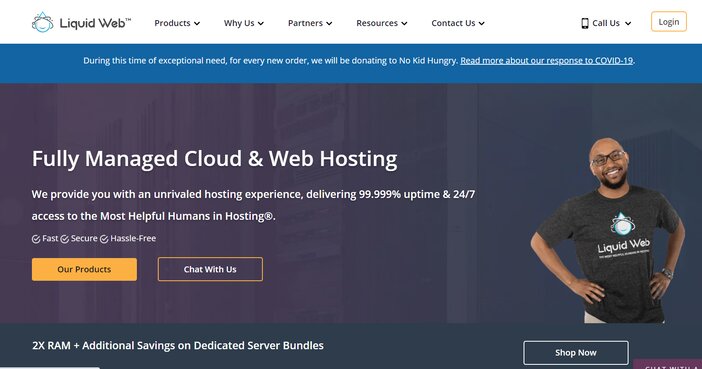
Liquid Web is among the most well-known hosts in this division, having established a solid reputation over the course of its nearly two-decade of existence.
Liquid Web, unlike some of the other web hosts on this list, does not focus exclusively on HIPAA-compliant hosting.
One of the things that set Liquid Web apart is that it only provides high-quality managed hosting to businesses of all sizes. As a result, it also applies this to its HIPAA-compliant hosting.
In other words, you can get compliant VPS, dedicated cloud, or dedicated server hosting. Liquid Web is among the most well-known hosts in this division, having established a solid reputation over the course of its nearly two-decade of existence.
Liquid Web, unlike some of the other web hosts on this list, does not focus exclusively on HIPAA-compliant hosting. One of the things that set Liquid Web apart is that it only provides high-quality managed hosting to businesses of all sizes.
As a result, it also applies this to its HIPAA-compliant hosting.
In other words, you can get compliant VPS, dedicated cloud, or dedicated server hosting.
Liquid Web is very thorough in describing how it complies with HIPAA standards, as well as all of the additional security measures it employs in general. But, most importantly, it’s fully managed, which is one of Liquid Web’s major advantages.
Customers will not have to deal with any headaches as a result of such safe hosting that fulfills HIPAA requirements.
2. Atlantic
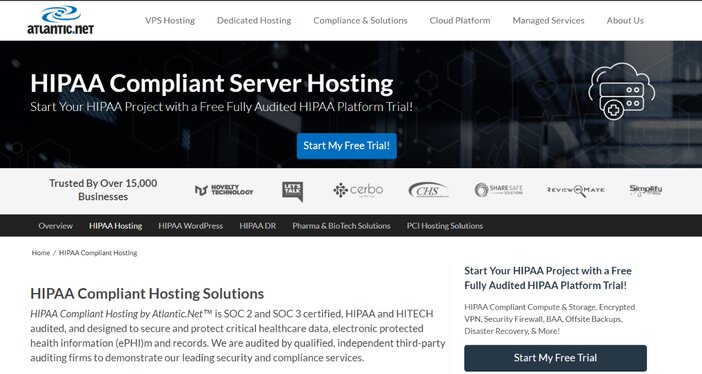
Many of the websites on this list have been around for a long time, but Atlantic.Net is the oldest, dating back to 1994.
It currently operates seven data centers worldwide, including two more on the way.
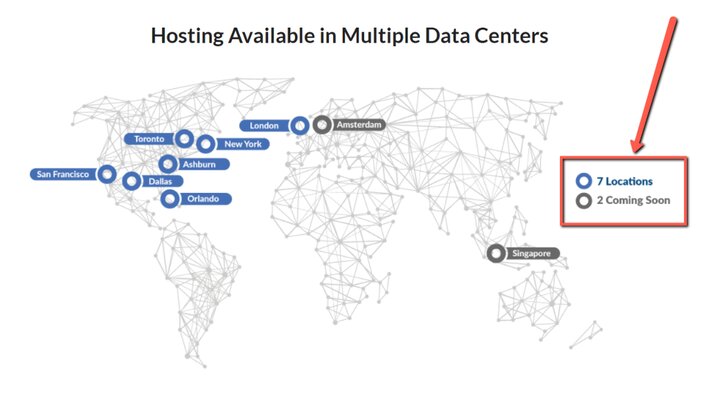
Atlantic is a solid cloud storage platform in general. However, it places a strong emphasis on HIPAA-compliant hosting services.
One of the factors it made the list is that it offers a wide variety of services, including HIPAA-compliant cloud storage, dedicated hosting, and even WordPress hosting. Databases and storage solutions that are HIPAA compliant are also available.
In addition to entirely meeting HIPAA requirements, the different hosting packages provide a slew of security features. In addition, Atlantic.Net guarantees a 99.9% uptime.
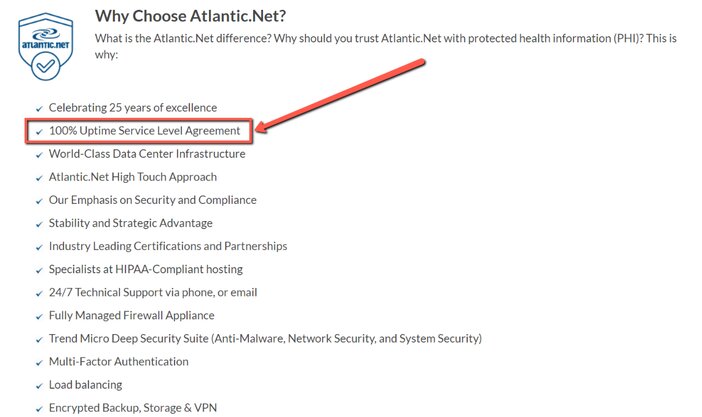
Furthermore, Atlantic.Net’s data centers have several certifications, including HIPAA compliance as well as other security and privacy requirements.

Atlantic.Net offers both managed and unmanaged hosting, with rates that are tailored to your needs.
3. Ntirety
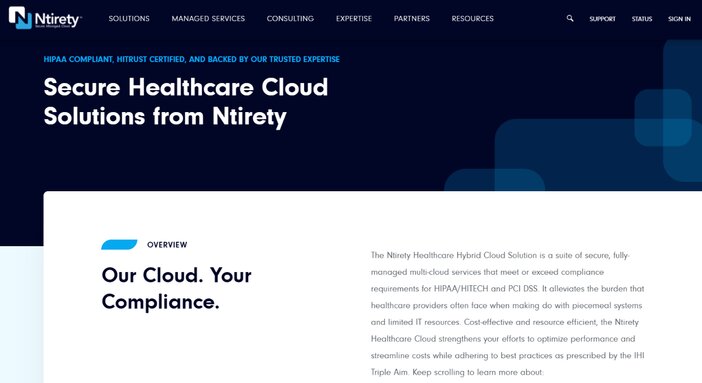
Ntirety is a global leader in providing stable managed hybrid and multi-cloud solutions to over 2,500 business customers.
Ntirety provides highly reliable and always accessible solutions, allowing the company to transition from managing operational risk to building a future-ready, agile organization, with over 500 top professional certifications in managing compliant, mission-critical workloads.
The Ntirety Healthcare Hybrid Cloud Solution is a safe, professionally managed multi-cloud solution that meets or exceeds HIPAA/HITECH and PCI DSS compliance standards.
It relieves the stress that healthcare professionals frequently experience when working with disparate networks and restricted IT resources.
They have a dedicated team of qualified information security and cloud enforcement professionals who manage and control your cloud hosting environments, ensuring that you stay ahead of your HIPAA/HITECH compliance requirements.
Ntirety is the first cloud service company to provide 100% Audit Assurance, having conducted over 400 customer protection tests with a 100% pass rate.
4. Rackspace
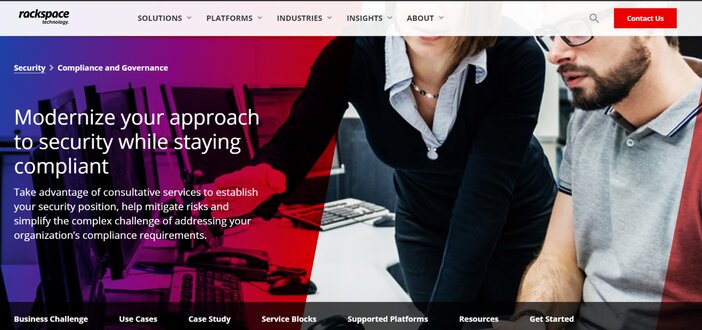
Rackspace is another well-known name in the web hosting business. Rackspace was founded in 1996 in a garage in Texas.
Open, private, and hybrid cloud servers are available from Rackspace. HIPAA-compliant hosting is available in the private cloud world.
They also have a HITRUST CSF (common security framework) qualification, indicating that they follow strict data privacy guidelines.
They have good hardware, 15+ operating systems, image backups, Raid 10, scalability, and a variety of other features.
More than half of the Fortune 100 companies now entrust the San Antonio-based managed services company with providing world-class infrastructure and personalized service.
Rackspace is a managed cloud and dedicated server provider that works with a number of vendors.
Rackspace’s end-to-end HIPAA enforcement includes custom designs, installations, and builds, as well as frequent evaluations of cloud and dedicated environments to ensure you’re meeting regulations as efficiently as possible.
5. HIPAA Vault
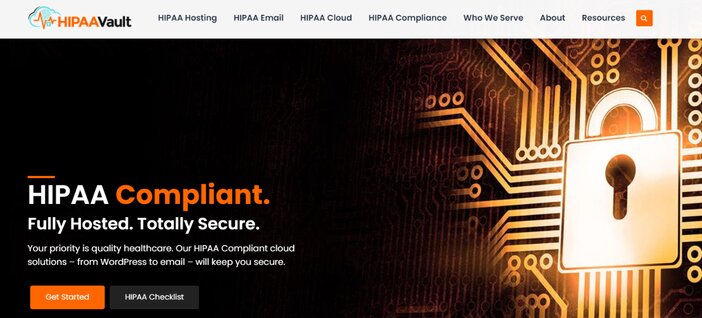
HIPAA Vault is a privately owned cloud service provider that offers a complete range of HIPAA-compliant services, including email, drives, hosting, email, fax, and sftp, among other things.
They have a trademarked approach called True HIPAA Compliance that they use to ensure that their cloud hosting solutions are HIPAA compliant 100 percent of the time, and they sign BAAs for all of their customers.
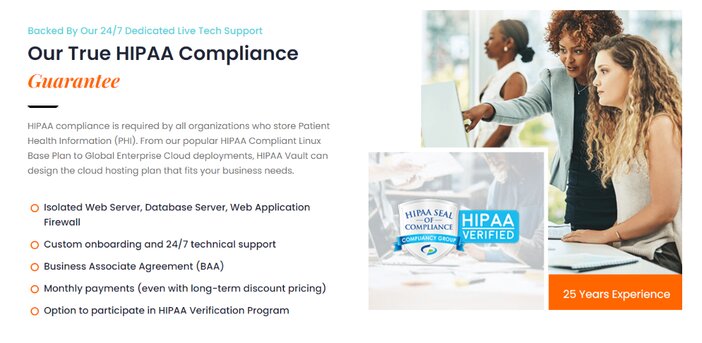
They are compatible with both Windows and Linux. The business offers electronic patient health information (e-PHI) and electronic medical records services (EMR).
Hardening, tracking, patching, testing, and server security are all included in their HIPAA-compliant plans.
Since the platform supports Android, laptop, and Apple applications mean that valuable documents and data can be accessed from almost anywhere.
See Also: 20+ Never Revealed Facts About Managed WordPress Hosting
How to Make a Website HIPAA Compliant
If you have a website that collects, stores or transmits PHI (Protected Health Information), you should make it HIPAA compliant to avoid breaking the law.
In this regard, the following actions must be taken:
1. Get a HIPAA compliant hosting
The first line of protection regarding compromised patient information is your web host.
Inquire whether your existing host follows HIPAA guidelines. If they don’t, it’s time to look for a new host.
HIPAA website hosting is an essential first line of protection towards personal health information (PHI).
Regular scans and upgrades can help protect confidential data from being compromised.
What if there are security concerns? As per HIPAA guidelines, your web host has 48 hours to fix the problem.
See Also: What Are The Different Types of Web Hosting? – The Ultimate Guide
2. Get an SSL certificate for your healthcare website
The next option is to assign an SSL certificate to your website, which will provide another layer of authentication.
SSL (Secure Sockets Layer) is a networking protocol that allows web users and servers to communicate securely over the internet.
An SSL certificate encrypts data sent from the user’s device to the server, making it incomprehensible to third parties.
Any person between the user and the server can view the information that goes through a non-SSL website, including confidential health or patient information.
Apart from complying with HIPAA regulations, a website that uses the HTTPS protocol is regarded as more trustworthy by both visitors and search engine algorithms, resulting in a higher ranking in search engine result pages (SERP).
3. Protect data collection
Any information you obtain from visitors must be submitted through HIPAA-compliant web forms.
This guarantees that every PHI you receive is safely captured and will not be compromised or fall into the wrong hands. Contact forms on the web can include questions about drugs, symptoms, or other health-related details.
Please ensure that any form on your website that needs PHI to be entered is encrypted.
As a result, you can keep your data more stable. Encrypted web forms protect any information entered into them and can only be accessed by entering a password.
4. Encrypt completed data
Although SSL encryption protects both the user and the server, you must also encrypt any data you store.
All data must be encrypted during transmission to ensure that it cannot be accessed if intercepted.
HIPAA has developed its own encryption standards for both “at rest” and “in motion” data.
Only the administrators and essential members of the team should have access to the data. In order to avoid data leakage and breaches, access controls must be configured.
See Also: The Best Encryption Software – Protect Your Data
5. Secure data storage
If you want to store your data on a cloud host or on physical servers, appropriate security measures must be in place.
When dealing with PHI, it is standard practice to encrypt the stored data. When storing data in the cloud, selecting HIPAA-compliant hosting makes your job simpler.
With any HIPAA compliant hosting, compliance is integrated into the structure of their service rather than being an afterthought since they are already familiar with HIPAA regulations.
These type of web hosts makes it easier for you to select the cloud server that best suits your needs, thanks to their multi-tiered pricing plans and comprehensive support.
6. Limit access to PHI
As you already know, PHI access is not needed for everyone in the workplace, and the same is true for online access.
The reason for this is to limit and ultimately reduce to the barest minimum, the possibility of patient health information been leaked.
With limited access to PHI, you stand a greater chance of being in control of who has access to such sensitive health information. Even when there is a data breach, it will be easier to trace the source of such a breach.
7. Get Business Associate Agreements
A Business Associate Agreement (BAA) is a legal agreement between both healthcare provider and a person or entity that will collect, distribute, or store Protected Health Information (PHI) as part of the provider’s services.
If you want to call it a Business Associate Agreement or a Business Associate Contract, as HIPAA does, they are an essential part of every organization’s HIPAA compliance efforts.
Both health care providers and health care merchants who come into contact with PHI must comply with HIPAA.
Within HIPAA, providers are referred to as “covered entities,” while vendors are referred to as “business associates.”
In the case of a violation, a strong HIPAA Business Associate Agreement always serves the essential purpose of shielding companies from liability.
If either of the two parties is liable for a violation of confidential health information, the BAA should expressly state that party’s responsibility.
Business partners must meet HIPAA guidelines to keep PHI safe, according to the contract.
8. Frequent data backups
To prevent total data loss, all data obtained by your website must be backed up on a regular basis.
Backups can be made on a local server with end-to-end encryption or on a protected cloud server that complies with HIPAA regulations.
All backed-up data must be secured, and access must be limited to a single user.
Any vulnerability in data storage and backup protocols could result in a HIPAA compromise, putting you in violation of HIPAA regulations.
9. Deleting information from the database
HIPAA requires that all data obtained or processed by your company be discarded until it is no longer relevant to your business.
To comply with HIPAA regulations, you must have procedures in place to ensure that data stored on the server and website database is deleted.
When data is permanently deleted from a computer, there is no way to restore it. When anyone leaves an organization, their data must leave as well.
10. Those with PHI access should be trained
Anyone who has access to PHI should take HIPPA compliance training. If your website is the result of a group of people working together, this is needed.
Without proper preparation, you cannot trust your workers to understand and obey all aspects of HIPAA’s often complex Privacy Rules. Ensure that all workers are aware of the procedures and know-how to carry them out.
This training should also cover the fundamentals of password security and how to treat patient grievances.
HIPAA regulations require “periodic” training, so include annual refreshers for all employees.
Frequently Asked Questions
1. Is Google Drive HIPAA compliant?
Yes.
Google Drive, which is part of Google Workspace, comes with all of the necessary parameters for a HIPAA-compliant operation.
TLS (Transport Layer Security) encryption is used to encrypt the platform, which protects patient PHI by erecting secure walls around the server. As a result, Google Drive is HIPAA-compliant in principle.
HIPAA enforcement, on the other hand, is dependent on the use of tech services rather than the services themselves.
In other words, the customer is in charge of enforcement. If a medical professional, secretary, or care worker performs the exchange and coordination of personal health information (PHI) in Google Workspace flawlessly, they will be HIPAA-compliant.
However, if users fail to communicate, construct, or exchange data correctly, data will not be fully protected, and it will be classified as noncompliance.
2. Is Bluehost HIPAA compliant?
No.
Bluehost does not comply with HIPAA regulations.
Under the federal HIPAA law and related legislation, you are not permitted to use Bluehost services to host “protected health information.”
3. What is a HIPAA server?
A HIPAA server is one that is compliant with the HIPAA regulations.
To avoid medical record information data leakage, a HIPAA server adheres to HIPAA’s strict enforcement guidelines.
HIPAA requires that all agencies handling PHI or ePHI data develop their own policies to ensure the security and confidentiality of those documents.
As a result of the move, it is now up to the parties involved to decide how to handle certain aspects of data security.
4. Do I need a HIPAA server?
If you’re not in the healthcare industry, you probably don’t need a HIPAA-compliant server.
When storing, transferring, reading, viewing, or otherwise accessing any kind of records that contains personally identifiable Health Information records, a HIPAA-compliant server is required.
5. Is WordPress HIPAA Compliant?
No.
Since they refuse to sign a business partner agreement, WordPress is not HIPAA compliant.
As a result, WordPress cannot be used to send or store ePHI. However, if no PHI is uploaded to the web, a covered entity (CE) can use WordPress.
WordPress allows webmasters to post office hours, contact details, and location information. WordPress may also be used to publish blogs and newsletters.
Finally, if you want to use WordPress to host your website, you won’t be able to enter any patient data. If you absolutely must, you must make your website HIPAA-compliant.
6. Which HIPAA host is best for you?
If all you need is a HIPAA-compliant email service, HIPAA Vault is the way to go.
However, I don’t believe you can go wrong with any of the above-mentioned hosting choices. They’re all HIPAA-compliant and provide high-quality hosting.
You can be assured that either of the web hosts above will keep their side of the bargain. Nonetheless, in some cases, one might be superior to the other.
Liquid Web is my top recommendation in general. Its rates are reasonable, and its customer service team will clear up any unanswered questions regarding HIPAA hosting. If you’re situated in the United Kingdom and want a local host, Atlantic.net is your best option.
Consider Rackspace if you operate a large business and need a provider that specializes in corporate hosting. The other two, however, still have corporate clients.
Since most of these hosts demand a quote for HIPAA compliant hosting, you can also get a quote from all of them and decide which platform is the best match for your particular needs.
7. How can AWS help with HIPAA hosting?
Particularly for those with a very large budget and timeline who need to create their own in-house platform, leveraging AWS to host any data is a smart step.
AWS presents you with an already-built and incredibly scalable framework in which to store your files, similar to how you’d use a rental facility to store objects rather than building a brand new structure.
AWS is without a doubt the best choice for 99% of businesses who need to be HIPAA compliant with their data, thanks to a plethora of Apps that extend the choices and capabilities.
8. Is a Gmail account HIPAA compliant?
No.
Gmail isn’t HIPAA-compliant by default, at least not in the way most companies use it.
Gmail is a free email service provided by Google, but it is not HIPAA compliant. Gmail, like the large majority of email providers, does not automatically encrypt addresses.
If you need to send sensitive information via email, make sure it’s encrypted.
Google encrypts emails only when they are in transit, not while they are in transit. Google Workspace is the only option out.
You’ll have to spend for an end-to-end email encryption service if you want to send PHI via Gmail-powered Google Workspace.
This means that it is up to you, the client, to protect confidential data contact.
Conclusion
That is everything there is to it. You should have a clear idea of what HIPAA-compliant hosting entails now.
A HIPAA infringement can cost a company a lot of money in terms of fines, criminal charges, and sales loss.
You can reduce the risks and put appropriate protections around electronically protected health information by signing up for a HIPAA-compliant hosting or data server.
Information protection isn’t easy, but it’s an important part of risk management in the contemporary world.
Liquid Web and Atlantic, two of our top recommended web hosts, have the capacity to provide the requisite HIPAA enforcement that you can need.
However, if all you need is a HIPAA-compliant email service, HIPAA Vault’s managed services are the way to go.
WebHost Bros is an online resource that helps you to find the best web host that is best for you. Here is a list of our recommended hosting providers in the market.
